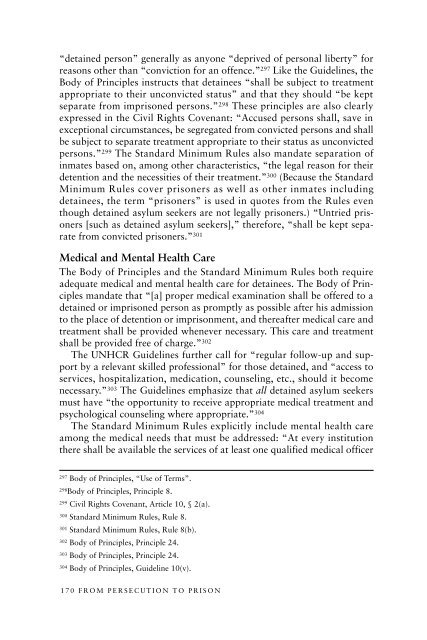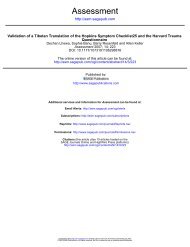From Persecution to Prison - Bellevue/NYU Program for Survivors of ...
From Persecution to Prison - Bellevue/NYU Program for Survivors of ...
From Persecution to Prison - Bellevue/NYU Program for Survivors of ...
Create successful ePaper yourself
Turn your PDF publications into a flip-book with our unique Google optimized e-Paper software.
“detained person” generally as anyone “deprived <strong>of</strong> personal liberty” <strong>for</strong>reasons other than “conviction <strong>for</strong> an <strong>of</strong>fence.” 297 Like the Guidelines, theBody <strong>of</strong> Principles instructs that detainees “shall be subject <strong>to</strong> treatmentappropriate <strong>to</strong> their unconvicted status” and that they should “be keptseparate from imprisoned persons.” 298 These principles are also clearlyexpressed in the Civil Rights Covenant: “Accused persons shall, save inexceptional circumstances, be segregated from convicted persons and shallbe subject <strong>to</strong> separate treatment appropriate <strong>to</strong> their status as unconvictedpersons.” 299 The Standard Minimum Rules also mandate separation <strong>of</strong>inmates based on, among other characteristics, “the legal reason <strong>for</strong> theirdetention and the necessities <strong>of</strong> their treatment.” 300 (Because the StandardMinimum Rules cover prisoners as well as other inmates includingdetainees, the term “prisoners” is used in quotes from the Rules eventhough detained asylum seekers are not legally prisoners.) “Untried prisoners[such as detained asylum seekers],” there<strong>for</strong>e, “shall be kept separatefrom convicted prisoners.” 301Medical and Mental Health CareThe Body <strong>of</strong> Principles and the Standard Minimum Rules both requireadequate medical and mental health care <strong>for</strong> detainees. The Body <strong>of</strong> Principlesmandate that “[a] proper medical examination shall be <strong>of</strong>fered <strong>to</strong> adetained or imprisoned person as promptly as possible after his admission<strong>to</strong> the place <strong>of</strong> detention or imprisonment, and thereafter medical care andtreatment shall be provided whenever necessary. This care and treatmentshall be provided free <strong>of</strong> charge.” 302The UNHCR Guidelines further call <strong>for</strong> “regular follow-up and supportby a relevant skilled pr<strong>of</strong>essional” <strong>for</strong> those detained, and “access <strong>to</strong>services, hospitalization, medication, counseling, etc., should it becomenecessary.” 303 The Guidelines emphasize that all detained asylum seekersmust have “the opportunity <strong>to</strong> receive appropriate medical treatment andpsychological counseling where appropriate.” 304The Standard Minimum Rules explicitly include mental health careamong the medical needs that must be addressed: “At every institutionthere shall be available the services <strong>of</strong> at least one qualified medical <strong>of</strong>ficer297Body <strong>of</strong> Principles, “Use <strong>of</strong> Terms”.298Body <strong>of</strong> Principles, Principle 8.299Civil Rights Covenant, Article 10, § 2(a).300Standard Minimum Rules, Rule 8.301Standard Minimum Rules, Rule 8(b).302Body <strong>of</strong> Principles, Principle 24.303Body <strong>of</strong> Principles, Principle 24.304Body <strong>of</strong> Principles, Guideline 10(v).170 FROM PERSECUTION TO PRISON



